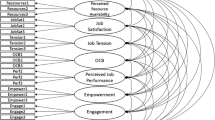Abstract
Individuals in managerial and professional jobs now work long hours for a variety of reasons. Building on previous research on workaholism and on types of passion, the results of three exploratory studies of correlates of work-based Passion and Addiction are presented. Data were collected in three samples using anonymously completed questionnaires: Canadian managers and professionals, Australian psychologists, and Norwegian journalists. A common pattern of findings was observed in the three samples. First, respondents scoring higher on Passion and on Addiction were more heavily invested in their work. Second, respondents scoring higher on Passion also indicated less obsessive job behaviors, greater work satisfactions, and higher levels of psychological well-being. Third, respondents scoring higher on Addiction indicated more obsessive job behaviors, lower work satisfaction, and lower levels of psychological well-being.
Similar content being viewed by others
References
Brett, J. M., Stroh, L. K. (2003) Working 61 Plus Hours a Week: Why do Managers do It? Journal of Applied Psychology, 88, 67–78
Buelmans, M., Poelmans, S. A. Y. (2004) Enriching the Spence and Robbins Typology of Workaholism: Demographic, Motivational and Organizational Correlates. Journal of Organizational Change Management, 17, 446–458
Burke, R. J. (2007) Research Companion to Working Time and Work Addiction. Cheltenham, UK: Edward Elgar
Deci, E. L., Koestner, R., Ryan, R. M. (1999) A Meta-Analysis Review of Experiments Examining the Effects of Extrinsic Rewards on Intrinsic Motivation. Psychological Bulletin, 125, 627–668
Deci, E. L., Ryan, R. M. (1985) Intrinsic Motivation and Self-Determination in Human Behavior. New York: Plenum
Deci, E. L., Ryan, R. M. (2000) The “What” and “Why” of Goal Pursuits: Human Needs and the Self-Determination of Behavior. Psychological Inquiry, 11, 227–268
Dembe, A. E., Erickson, J. B., Delbos, R. G., Banks, S. M. (2005) The Impact of Overtime and Long Work Hours on Occupational Injuries and Illnesses: New Evidence from the United States. Occupational and Environmental Medicine, 62, 588–597
DeRaeve, L., Jansen, N. W. H., Kant, I. J. (2007) Health Effects of Transitions in Work Schedule, Work Hours and Overtime in a Prospective Cohort Study. Scandanavian Journal of Work, Environment and Health, 33, 105–113
Fredrickson, B. L. (1998) What Good are Positive Emotions? Review of General Psychology, 2, 300–319
Fredrickson, B. L. (2001) The Role of Positive Emotions in Positive Psychology: The Broaden-and-Build Theory of Positive Emotions. American Psychologist, 56, 218–226
Golden, L. (2007) How Long? The Historical, Economic and Cultural Factors Behind Working Hours and Overwork. In R. J. Burke (ed.) Research Companion to Working Time and Work Addiction. Cheltenham, UK: Edward Elgar, pp 36–60
Graves, L. M., M. Ruderman and P. J. Ohlott: 2006, Effect of Workaholism on Managerial Performance: Help or Hindrance, Paper Presented at the Academy of Management, Atlanta, August
Hewlett, S. A. and C. B. Luce: 2006, ‹Extreme Jobs: The Dangerous Allure of the 70-Hour Work Week’, Harvard Business Review, December, 49–59
Johnstone, A., Johnston, L. (2005) The Relationship Between Organizational Climate, Occupational Type and Workaholism. New Zealand Journal of Psychology, 34, 181–188
Kanai, A., Wakabayaski, M., Fing, S. (1996) Workaholism Among Employees in Japanese Corporations: An Examination Based on the Japanese Version of the Workaholism Scales. Japanese Psychological Research, 38, 192–203
Kawahito, H.: 1991, ‹Death and the Corporate Warrior’, Japan Quarterly, April–June, 149–158
Lyubormirsky, S. L., King, L., Diener, E. (2005) The Benefits of Frequent Positive Affect: Does Happiness Lead to Success. Psychological Bulletin, 131, 803–855
Machlowitz, M. (1980) Workaholics: Living with Them, Working with Them. Reading, MA: Addison-Wesley
Pressman, S. D., Cohen, S. (2005) Does Positive Affect Influence Health? Psychological Bulletin, 131, 925–971
Robinson, B. E. (1998) Chained to the Desk: A Guidebook for Workaholics, Their Partners and Children and the Clinicians Who Treat Them. New York: NYU Press
Ryan, R. M., Deci, E. L. (2000) Self-Determination Theory and the Facilitation of Intrinsic Motivation, Social Development, and Well-Being. American Psychologist, 55, 68–78
Schaufeli, W. B., Taris T. W., Bakker, A. B. (2007) Dr. Jekyll or Mr. Hyde: On the Difference Between Work Engagement and Workaholism. In R. J. Buirke (ed.) Research Companion to Working Time and Work Addiction. Cheltenham, UK: Edward Elgar, pp 193–220
Scott, K. S., Moore, K. S., Miceli, M. P. (1997) An Exploration of the Meaning and Consequences of Workaholism. Human Relations, 50, 287–314
Sparks K., Cooper C. L., Fried Y., Shirom A. (1997) The Effects of Hours or Work on Health: A Meta-Analytic Review. Journal of Occupational and Organizational Psychology 70, 391–408
Spence, J. T., Robbins, A. S. (1992) Workaholism: Definition, Measurement, and Preliminary Results. Journal of Personality Assessment, 58, 160–178
Uehata, T. (1990) Karoshi: When the Corporate Warrior Dies. Tokyo: Mado-sha
van der Hulst, M. (2003) Long Work Hours and Health. Scandinavian Journal of Work, Environment and Health, 29, 171–188
Vallerand, R. J., Blanchard, C. M., Mageau, G. A., Koestner, R., Ratelle, C., Leonard, M., Gagne, M. (2003) Les passions de l’ame: On Obsessive and Harmonious Passion. Journal of Personality and Social Psychology, 85, 756–767
Virick, M. and Y. Baruch: 2007, Factors Determining Workaholism, Its Positive and Negative Consequences, Paper Presented at the Academy of Management, Philadelphia, August
Author information
Authors and Affiliations
Corresponding author
Additional information
Preparation of this manuscript was supported in part by York University. We thank our colleagues for their help in the collection of the data: Stig Berge Mathiesen, Zena Burgess, Fay Oberklaid, and Graeme MacDermid.
Readers interested in obtaining more details about these three studies should contact Ronald J. Burke: rburke@schulich.yorku.ca
Rights and permissions
About this article
Cite this article
Burke, R.J., Fiksenbaum, L. Work Motivations, Work Outcomes, and Health: Passion Versus Addiction. J Bus Ethics 84 (Suppl 2), 257–263 (2009). https://doi.org/10.1007/s10551-008-9697-0
Published:
Issue Date:
DOI: https://doi.org/10.1007/s10551-008-9697-0



